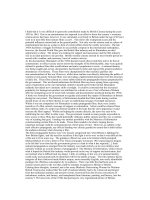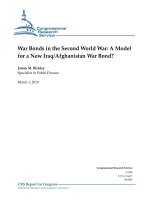The second world war volume iv the hingle of fate
Bạn đang xem bản rút gọn của tài liệu. Xem và tải ngay bản đầy đủ của tài liệu tại đây (6.18 MB, 1,207 trang )
Tai Lieu Chat Luong
THE HINGE OF FATE
WINSTON CHURCHILL
The Hinge of Fate
2
Copyright
The Hinge Of Fate
Copyright © 1950 by Winston Churchill
Cover art and eForeword to the electronic edition copyright
© 2002 by RosettaBooks, LLC
All rights reserved. No part of this book may be used or
reproduced in any manner whatsoever without written
permission except in the case of brief quotations embodied
in critical articles and reviews.
For information address
First electronic edition published 2002 by RosettaBooks
LLC, New York.
ISBN 0-7953-0622-9
The Hinge of Fate
3
Contents
eForeword
Preface
Acknowledgments
Book One
The Onslaught of Japan
1: Australasian Anxieties
2: The Setback in the Desert
3: Penalties in Malaya
4: A Vote of Confidence
5: Cabinet Changes
6: The Fall of Singapore
7: The U-Boat Paradise
8: The Loss of the Dutch East Indies
9: The Invasion of Burma
10: Ceylon and the Bay of Bengal
11: The Shipping Stranglehold
12: India — The Cripps Mission
13: Madagascar
The Hinge of Fate
14: American Naval VictoriesThe Coral Sea and
Midway Island
15: The Arctic Convoys,1942
16: The Offensive in the Aether
17: Malta and the Desert
18: “Second Front Now!”April, 1942
19: The Molotov Visit
20: Strategic Natural Selection
21: Rommel Attacks
22: My Second Visit to Washington
23: The Vote of Censure
Book Two
Africa Redeemed
1: The Eighth Army at Bay
2: Decision for “Torch”
3: My Journey to Cairo:Changes in Command
4: Moscow: The First Meeting
5: Moscow:A Relationship Established
6: Return to Cairo
7: The Final Shaping of “Torch”
8: Suspense and Strain
9: Soviet “Thank You”
10: The Battle of Alamein
11: The Torch is Lit
12: The Darlan Episode
4
The Hinge of Fate
13: Problems of Victory
14: Our Need to Meet
15: The Casablanca Conference
16: Adana and Tripoli
17: Home to Trouble
18: Russia and the Western Allies
19: Victory in Tunis
20: My Third Visit to Washington
21: Problems of War and Peace
22: Italy the Goal
Appendices
Notes
About the Author
About this Title
5
The Hinge of Fate
6
Maps and Diagrams
Chart to Illustrate Mediterranean Campaigns, 1942
The Setback in the Desert, January, 1942
Malaya, Situation January 1, 1942
The Malayan Peninsula
Singapore Island
The U-Boats in American Waters December 7, 1941, to
July 31, 1942
The Atlantic, General Area of North Atlantic Convoys
Losses by U-Boat, January to July, 1942
The Crisis of Battle August 1, 1942, to May 21, 1943
The A.B.D.A. Area of Operations
Burma
The Indian Ocean
Madagascar
Pacific Theatre
Solomons — New Guinea
Track of P.Q.17
Russian Winter Offensives, January to March, 1942
Diagram 1. Enemy Plan for May 27–28
The Hinge of Fate
Diagram 2. The Battle for Tobruk
The Western Desert
Tobruk
The Action at Minqa Qaim
The Western Desert
The German Campaign in Russia, 1942
The Battle of Alam el Halfa
Russian Counter-attacks at Stalingrad
The Opposing Forces, October 23, 1942
The Plan of Attack
Battle of el Alamein. Northern Sector
“Supercharge”: The Break-through
Algiers — Tunis
The North Coast of Africa
The Front in Russia, April, 1942, to March, 1943
Tunisia
The Battle of Mareth
Tunis — The Last Phase May 6–12, 1943
7
The Hinge of Fate
8
eForeword
One of the most fascinating works of history ever written,
Winston Churchill’s monumental The Second World War is
a six-volume account of the struggle of the Allied powers in
Europe against Germany and the Axis. Told through the
eyes of British Prime Minister Winston Churchill, The
Second World War is also the story of one nation’s singular,
heroic role in the fight against tyranny. Pride and patriotism
are evident everywhere in Churchill’s dramatic account and
for good reason. Having learned a lesson at Munich that
they would never forget, the British refused to make peace
with Hitler, defying him even after France had fallen and
after it seemed as though the Nazis were unstoppable.
Churchill remained unbowed throughout, as did the people
of Britain in whose determination and courage he placed
his confidence.
Patriotic as Churchill was, he managed to maintain a
balanced impartiality in his description of the war. What is
perhaps most interesting, and what lends the work its
tension and emotion, is Churchill’s inclusion of a significant
amount of primary material. We hear his retrospective
analysis of the war, to be sure, but we are also presented
with memos, letters, orders, speeches, and telegrams that
give a day-by-day account of the reactions-both mistaken
and justified-to the unfolding drama. Strategies and
counterstrategies develop to respond to Hitler’s ruthless
conquest of Europe, his planned invasion of England, and
The Hinge of Fate
9
his treacherous assault on Russia. It is a mesmerizing
account of the crucial decisions that have to be made with
imperfect knowledge and an awareness that the fate of the
world hangs in the balance.
The fourth volume in this work, The Hinge of Fate is, as its
name might suggest, the dramatic account of the Allies’
changing fortunes. By the end of the previous volume, The
Grand Alliance, the Russians and the Americans had both
entered the war on the side of the British, but Germany,
Italy and Japan continued pressing forward successfully
with their terrible onslaught. In the first half of The Hinge of
Fate, Churchill describes the fearful period in which the
Germans threaten to overwhelm the Red Army, Rommel
dominates the war in the desert, and Singapore falls to the
Japanese. In the span of just a few months, however, the
Allies begin to turn the tide, achieving decisive victories at
Midway and Guadalcanal, and repulsing the Germans at
Stalingrad. As their confidence builds, and they begin to
gain ground against the Axis powers, the Allies can begin to
see the end of this terrible conflict in sight.
Churchill won the Nobel Prize for Literature in 1953 due in
no small part to this awe-inspiring work.
RosettaBooks is the leading publisher dedicated exclusively
to electronic editions of great works of fiction and non-fiction
that reflect our world. RosettaBooks is a committed epublisher, maximizing the resources of the Web in opening
a fresh dimension in the reading experience. In this
electronic reading environment, each RosettaBook will
enhance the experience through The RosettaBooks
Connection. This gateway instantly delivers to the reader
the opportunity to learn more about the title, the author, the
content and the context of each work, using the full
resources of the Web.
The Hinge of Fate
10
To experience The RosettaBooks Connection for The Hinge
of Fate:
www.RosettaBooks.com/TheHingeOfFate
The Hinge of Fate
11
Preface
INThe Gathering Storm, Their Finest Hour, and The Grand
Alliance I have described as I saw them the events leading
to the Second World War, the conquest of Europe by Nazi
Germany, the unflinching resistance of Britain alone until
the German attack on Russia and the Japanese assault
brought the Soviet Union and the United States to our side.
In Washington, at the turn of the year, President Roosevelt
and I, supported by our Chief Military and Naval Advisers,
proclaimed The Grand Alliance, and prescribed the main
strategy for the future conduct of the war. We had now to
face the onslaught of Japan.
Such was the scene when on January 17, 1942, I landed at
Plymouth; and here the tale of this volume begins.
Again it is told from the standpoint of the British Prime
Minister, with special responsibility, as Minister of Defence,
for military affairs. Again I rely upon the series of my
directives, telegrams, and minutes, which owe their
importance and interest to the moment in which they were
written, and which I could not write in better words now.
These original documents were dictated by me as events
broke upon us. As they are my own composition, written at
the time, it is by these that I prefer to be judged. It would be
easier to produce a series of afterthoughts when the
answers to all the riddles were known, but I must leave this
The Hinge of Fate
12
to the historians who will in due course be able to
pronounce their considered judgments.
I have called this volume The Hinge of Fate because in it
we turn from almost uninterrupted disaster to almost
unbroken success. For the first six months of this story all
went ill; for the last six months everything went well. And
this agreeable change continued to the end of the struggle.
WINSTON S. CHURCHILL
Chartwell,
Westerham,
Kent
September 1, 1950
The Hinge of Fate
13
Acknowledgments
I MUST AGAIN ACKNOWLEDGE the assistance of those who
helped me with the previous volumes, namely, LieutenantGeneral Sir Henry Pownall, Commodore G. R. G. Allen,
Colonel F. W. Deakin, and Sir Edward Marsh, Mr. Denis
Kelly, and Mr. C. C. Wood. I have also to thank the very
large number of others who have kindly read these pages
and commented upon them.
Lord Ismay has continued to give me his aid, as have my
other friends.
I record my obligation to His Majesty’s Government for
permission to reproduce the text of certain official
documents of which the Crown Copyright is legally vested
in the Controller of His Majesty’s Stationery Office. At the
request of His Majesty’s Government, on security grounds I
have paraphrased some of the telegrams published in this
volume. These changes have not altered in any way the
sense or substance of the telegrams.
I wish to acknowledge my debt to Captain Samuel Eliot
Morison, U.S.N.R., whose books on naval operations give a
clear presentation of the actions of the United States Fleet.
I am indebted to the Roosevelt Trust for the use they have
permitted of the President’s telegrams quoted here, and
also to others who have allowed their private letters to be
published.
The Hinge of Fate
14
Moral of the Work
In War: Resolution
In Defeat: Defiance
In Victory: Magnanimity
In Peace: Good Will
The Hinge of Fate
15
Theme of the Volume
How the power of the
Grand Alliance
became preponderant
The Hinge of Fate
16
Book One
The Onslaught of Japan
The Hinge of Fate
17
1
Australasian Anxieties
The New Shape of the War — Assurance of Final
Victory — Anglo-American Nakedness in the
Pacific — Potential Impact of Japan upon
Australia and New Zealand — My Correspondence with Mr. Curtin — His Appeal to President
Roosevelt — Mr. Bowden’s Reports of the Peril of
Singapore — Mr. Curtin’s Article in the “Melbourne
Herald”— I Accept Full Responsibility for the
Distribution of Our Resources — My Reply to Mr.
Curtin of January 3 —And of January 14 —Safe
Arrival of the First Convoy at Singapore —
Explanations to New Zealand—Mr. Curtin’s Cable
of January 18, and My Answer — A General
Survey—The Australian Case — The Pacific War
Councils in London and Washington Begin to
Function.
THIS NEW YEAR of the Second World War, 1942, opened
upon us in an entirely different shape for Britain. We were
no longer alone. At our side stood two mighty Allies. Russia
and the United States were, though for different reasons,
irrevocably engaged to fight to the death in the closest
concert with the British Empire. This combination made
final victory certain unless it broke in pieces under the
strain, or unless some entirely new instrument of war
appeared in German hands. There was indeed a new
instrument of war for which both sides were avidly groping.
The Hinge of Fate
18
As it turned out it was into our already stronger hands that
the secret of the atomic bomb was destined to fall. A fearful
and bloody struggle lay before us and we could not foresee
its course, but the end was sure.
The Grand Alliance had now to face the onslaught of
Japan. This had been long prepared, and fell upon the
British and American fronts — if such they could be called
— with cruel severity. At no moment could it be conceived
that Japan would overcome the United States, but heavy
forfeits had to be paid by them, in the Philippines and other
islands, and by the British and the hapless Dutch in
Southeast Asia and the Pacific Ocean. Russia, in mortal
grip with the main German Army, suffered only from the
Japanese assault by the diversion of Anglo-American
energies and supplies which would have aided her. Britain
and the United States had a long period of torturing defeats
before them which could not affect the final issue but were
hard for their peoples to endure. Britain was naked because
our strength was absorbed elsewhere, and the Americans
had scarcely begun to gather their almost limitless
resources. To us in the British Isles it seemed that
everything was growing worse, although on reflection we
knew that the war was won.
In spite of the heavy new burdens which fell upon us, there
was no addition to our dangers at home. Australia and New
Zealand, on the other hand, felt suddenly plunged into the
forefront of the battle. They saw themselves exposed to the
possibility of direct invasion. No longer did the war mean
sending aid across the oceans to the Mother Country in her
distress and peril. The new foe could strike straight at
Australian homes. The enormous coast-lines of their
continent could never be defended. All their great cities
were on the seaboard. Their only four well-trained divisions
of volunteers and the New Zealand Division, all their best
The Hinge of Fate
19
officers, were far away across the oceans. The naval
command of the Pacific had passed in a flash and for an
indefinite period to Japan. Australasian air-power hardly
existed. Can we wonder that deep alarm swept Australia or
that the thoughts of their Cabinet were centred upon their
own affairs?
It will always be deemed remarkable that in this deadly
crisis, when, as it seemed to them and their professional
advisers, destruction was at the very throat of the Australian
Commonwealth, they did not all join together in a common
effort. But such was their party phlegm and rigidity that local
politics ruled unshaken. The Labour Government, with its
majority of two, monopolised the whole executive power,
and conscription even for home defence was banned.
These partisan decisions did less than justice to the spirit of
the Australian nation, and made more difficult our task in
providing, so far as possible, for their security while
observing a true sense of proportion in world strategy.
The sombre pages of this volume must open with my
correspondence with the Australian Prime Minister, Mr.
Curtin. Our discussions about the relief of the Australian
troops in Tobruk had not been agreeable. Later in the war,
in easier times, when he came over to England and we all
got to know him well, there was general respect and liking
for this eminent and striking Australian personality, and I
personally formed with him a friendship which, alas, was cut
short by his untimely death. At this moment however, when
pressures from all sides were so fierce, I was too conscious
of the depth and number of the differences in outlook that
divided us, and I regret any traces of impatience which my
telegrams may bear.
While in Washington I received a series of messages from
Mr. Curtin and Dr. Evatt, Australian Minister for External
The Hinge of Fate
20
Affairs, through their representative in Washington, Mr.
Casey. Mr. Curtin also sent the following telegram to
President Roosevelt.
26 Dec. 41
At this time of great crisis I desire to address you
both while you are conferring for the purpose of
advancing our common cause.
2. I have already addressed a communication to Mr.
Churchill on the question of Russia, which I regard as
of great importance in relation to the war with Japan,
and which I hope will receive the consideration of you
both during the conference.
3. I refer now to a matter of more pressing importance.
4. From all reports it is very evident that in North
Malaya the Japanese have assumed control of air and
sea. The small British army there includes one
Australian division, and we have sent three air
squadrons to Malaya and two to the Netherlands East
Indies. The army must be provided with air support,
otherwise there will be a repetition of Greece and
Crete, and Singapore will be grievously threatened.
5. The fall of Singapore would mean the isolation of
the Philippines, the fall of the Netherlands East Indies,
and an attempt to smother all other bases. This would
also sever our communications between the Indian and
Pacific Oceans in this region.
6. The setback would be as serious to the United
States’ interests as to our own.
7. Reinforcements earmarked by the United
Kingdom for dispatch to Malaya seem to us to be utterly
inadequate, especially in relation to aircraft, and more
particularly fighting aircraft…. Small reinforcements are
of little avail. In truth, the amount of resistance to the
Japanese in Malaya will depend directly on the amount
of resistance provided by the Governments of the
United Kingdom and the United States.
8. Our men have fought and will fight valiantly. But
they must be adequately supported. We have three
The Hinge of Fate
21
divisions in the Middle East. Our airmen are fighting in
Britain and the Middle East and are training in Canada.
We have sent great quantities of supplies to Britain, to
the Middle East, and to India. Our resources here are
very limited indeed.
9. It is in your power to meet the situation. Should
the Government of the United States desire, we would
gladly accept an American commander in the Pacific
area. The President has said that Australia will be a
base of increasing importance, but, in order that it shall
remain a base, Singapore must be reinforced.
10. In spite of our great difficulties, we are sending
further reinforcements to Malaya.
11. I would be glad if this matter could be regarded
as of the greatest urgency.
The reports which Dr. Evatt received from Mr. Bowden, the
Commonwealth Commissioner in Singapore, were also
transmitted to me. They were grave and proved true.
26 Dec. 41
Reports read today indicate air situation deteriorating daily. Eight British fighters lost yesterday against
three or four Japanese.
Kuala Lumpur and Port Swettenham are now our
advance landing-grounds for air reconnaissance, but
difficult even to carry out air reconnaissance in face of
Japanese superiority in machines. Greater part of our
fighters now withdrawn to Singapore for defence of
island and base. Nevertheless, Air Officer Commanding
stated that to provide effective fighter escort for naval
convoys approaching with sorely needed reinforcements, men, and material, he would have to leave
Singapore unguarded.
And further:
I feel I must emphasise that deterioration of war
position in Malayan defence is assuming [the aspect of
a] landslide collapse of whole defence system.
Expected arrival of modern fighter planes in boxes,
The Hinge of Fate
22
requiring weeks of assembly, under danger of
destruction by bombing, cannot save the position. The
renewal of military reinforcements expected will be
absorbed in relief of tired front-line troops and will
create little difference. British defence policy now
concentrates greater part of fighter and anti-aircraft
defence of Malaya on Singapore Island to protect naval
base, starving forward troops of such defence,
including the Australian Imperial Force.
Present measures for reinforcement of Malayan
defences can from the practical viewpoint be little more
than gestures. In my belief, [the] only thing that might
save Singapore would be the immediate dispatch from
the Middle East by air of powerful reinforcements, large
numbers of the latest fighter aircraft, with ample
operationally trained personnel. Reinforcements should
be not in brigades but in divisions, and to be of use
they must arrive urgently. Anything that is not powerful,
modern, and immediate is futile. As things stand at
present, the fall of Singapore is to my mind only [a]
matter of weeks. If Singapore and A.I.F. in Malaya are
to be saved there must be very radical and effective
action immediately.
[I] Doubt whether visit of an Australian Minister can
now have any effect, as the plain fact is that without
immediate air reinforcement Singapore must fall. Need
for decision and action is matter of hours, not days.
Dr. Evatt added that in his judgment Bowden’s summary
set out the position correctly. “If it cannot be met in the way
he suggests, the worst can be expected.”
On December 27 Mr. Curtin wrote a signed article in the
Melbourne Herald which was flaunted round the world by
our enemies. Among other things he said:
We refuse to accept the dictum that the Pacific
struggle must be treated as a subordinate segment of
The Hinge of Fate
23
the general conflict. By that it is not meant that any one
of the other theatres of war is of less importance than
the Pacific, but that Australia asks for a concerted plan
evoking the greatest strength at the Democracies’
disposal, determined upon hurling Japan back.
The Australian Government therefore regards the
Pacific struggle as primarily one in which the United
States and Australia must have the fullest say in the
direction of the Democracies’ fighting plan.
Without any inhibitions of any kind, I make it quite
clear that Australia looks to America, free of any pangs
as to our traditional links with the United Kingdom.
We know the problems that the United Kingdom
faces. We know the constant threat of invasion. We
know the dangers of dispersal of strength. But we know
too that Australia can go, and Britain can still hold on.
We are therefore determined that Australia shall not
go, and we shall exert all our energies toward the
shaping of a plan, with the United States as its
keystone, which will give to our country some
confidence of being able to hold out until the tide of
battle swings against the enemy.
Summed up, Australian external policy will be
shaped toward obtaining Russian aid, and working out,
with the United States, as the major factor, a plan of
Pacific strategy, along with British, Chinese, and Dutch
forces.
This produced the worst impression both in high American
circles and in Canada. I was sure that these outpourings of
anxiety, however understandable, did not represent
Australian feeling. Mr. W. M. Hughes, Australian Prime
Minister in the First World War and leader of the Federal
United Australia Party (the famous “Billy Hughes”),
immediately said that it would be “suicidal and a false and
dangerous policy for Australia to regard Britain’s support as
being less important than that of other great associated
countries.” There was a keen controversy in Australia. I
cabled from Washington to Mr. Attlee: “I hope there will be
The Hinge of Fate
24
no pandering to this, while at the same time we do all in
human power to come to their aid….” I weighed painfully in
my mind the idea of making a broadcast direct to the
Australian people. At the same time I fully accepted the
responsibility which fell on me. “I hope you will endeavour
to let all issues stand over until I return, so that I may face
any opposition myself…. If the Malay peninsula has been
starved for the sake of Libya and Russia, no one is more
responsible than I, and I would do exactly the same again.
Should any questions be asked in Parliament I should be
glad if it could be stated that I particularly desire to answer
them myself on my return.”
I replied at once to Mr. Curtin on the military position:
Prime Minister to Mr.
Curtin
3 Jan. 42
General Wavell’s command area is limited to the
fighting zone where active operations are now
proceeding. Henceforward it does not include Australia,
New Zealand, and communications between the United
States and Australia, or indeed any other ocean
communications. This does not of course mean that
these vital regions and communications are to be left
without protection so far as our resources admit. In our
view, the American Navy should assume the responsibility for the communications, including the islands right
up to the Australian or New Zealand coast. This is what
we are pressing for. Admiral King has only just been
given full powers over the whole of the American Navy,
and he has not yet accepted our views. Obviously, if I
cannot persuade the Americans to take over, we shall
have to fill the gap as best we can, but I still hope our
views will be accepted, in which case of course any
vessels we or you have in that area will come under
United States direction while operating there. There
never has been any intention to make the main Allied









